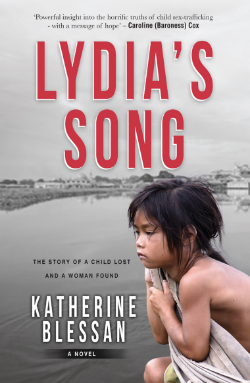'Painful insight into child sex-trafficking'
In her debut novel Lydia's Song Katherine Blessan draws on her Cambodian experiences to both give a face to human trafficking - and a message of hope amid its horrific truths
“Rotherham child sexual abuse scandal is tip of iceberg.” “Up to 373 girls may have been sex abuse victims in Oxfordshire.”
 These headlines are a stark reminder that child sex-trafficking is no longer something that is ‘out there’, but something that is happening right now here in the UK.
These headlines are a stark reminder that child sex-trafficking is no longer something that is ‘out there’, but something that is happening right now here in the UK.
Whether here or overseas, the fact of the matter is that child sex-trafficking is a global crime of shocking proportions. UNICEF reports that as many as 2,000,000 children are sexually exploited around the globe each year.
But the massive numbers involved and the hidden nature of the ‘trade’ can make it hard to see the individuals who are so brutally affected. In her debut novel Lydia’s Song Katherine Blessan seeks to address just this issue.
Drawing on first-hand accounts of the child sex-trade in Cambodia, Katherine presents an all-too-credible account of how quickly girls can find themselves enslaved. The book is honest in its descriptions of the brutal way these children are treated and how powerless they are to change their own fates without the help of others devoted to freeing them.
Endorsing Lydia’s Song, Baroness Caroline Cox, who has written about human trafficking, comments, ‘This powerful novel gives a challengingly painful insight into the horrific truths of child sex-trafficking.
'The book describes the raw suffering of sexual slavery and the poignancy of complex relationships affected by trafficking but concludes with a message of hope – that Christ’s power can enable love and forgiveness even in extreme cruelty and suffering.’
Katherine lived and taught in Cambodia for two and a half years and she writes much of the story through the eyes of Lydia, an English teacher living in the capital.
Lydia’s experiences of Cambodia and its people are drawn on Katherine’s own experiences and her romantic involvement with a local man adds depth and life to the novel. When a young and vulnerable girl, Song, unexpectedly crosses her path, Lydia takes Song to live in her home and cares for her.
However, both their lives are dramatically turned upside down when Song is kidnapped and sold into Cambodia’s ugly virginity market. ‘When I first got the idea for my novel it gripped me and wouldn't allow me to let it go,’ comments Katherine. ‘Even though it was a long eight year process, the combination of elements and themes convinced me I had a story worth telling.’
Katherine admits that her own experience of life in Cambodia was not as dramatic as the one Lydia eventually leads, and she only ever caught glimpses of the sex-trade in action, but through her contacts and research she became aware of the realities involved.
The Cambodian sex-trade is complex and the immunity most perpetrators face from prosecution is brought to the fore in Lydia’s ultimately fruitless attempts to track down Song.
However, the book reveals the important role played by many NGOs and charities in combatting the crime. After Song is moved on to work in a squalid Phnom-Penh brothel, Katherine describes how she is eventually rescued by a faith-based mission from prostitution and given a chance to find a new life and identity. When Lydia and Song finally meet again many years later Song has an incredible tale of both pain and hope to share.
Other issues are also touched upon in the book, such as the adoption by Westerners of children in what is now known as ‘the majority world’ as well as the impact of HIV on those involved in the sex-trade. Lydia’s Song is infused with the knowledge of the power of the gospel to transform lives, at the same time as acknowledging the questions raised by believers and unbelievers alike about how suffering can cohabit with faith in a loving God.
Katherine is keen to write further stories about the impact of the gospel on ordinary people’s lives, and believes with a passion in the power of literature to hold a mirror up to people’s hearts with truth, going all the way back to her first encounter with C. S. Lewis’ Chronicles of Narnia as a child. In The Silver Chair, Puddleglum says to the Queen of the Underworld when she is trying to convince the Narnians that Narnia is not real: “Four babies playing a game can make a play-world which licks your real world hollow. That’s why I’m going to stand by the play-world. I’m on Aslan’s side even if there isn’t any Aslan to lead it. I’m going to live as like a Narnian as I can even if there isn’t any Narnia.”
In the same way, stories that reflect something of God’s kingdom purposes can touch people’s imaginations with their authenticity.
Baptist Times, 15/07/2015